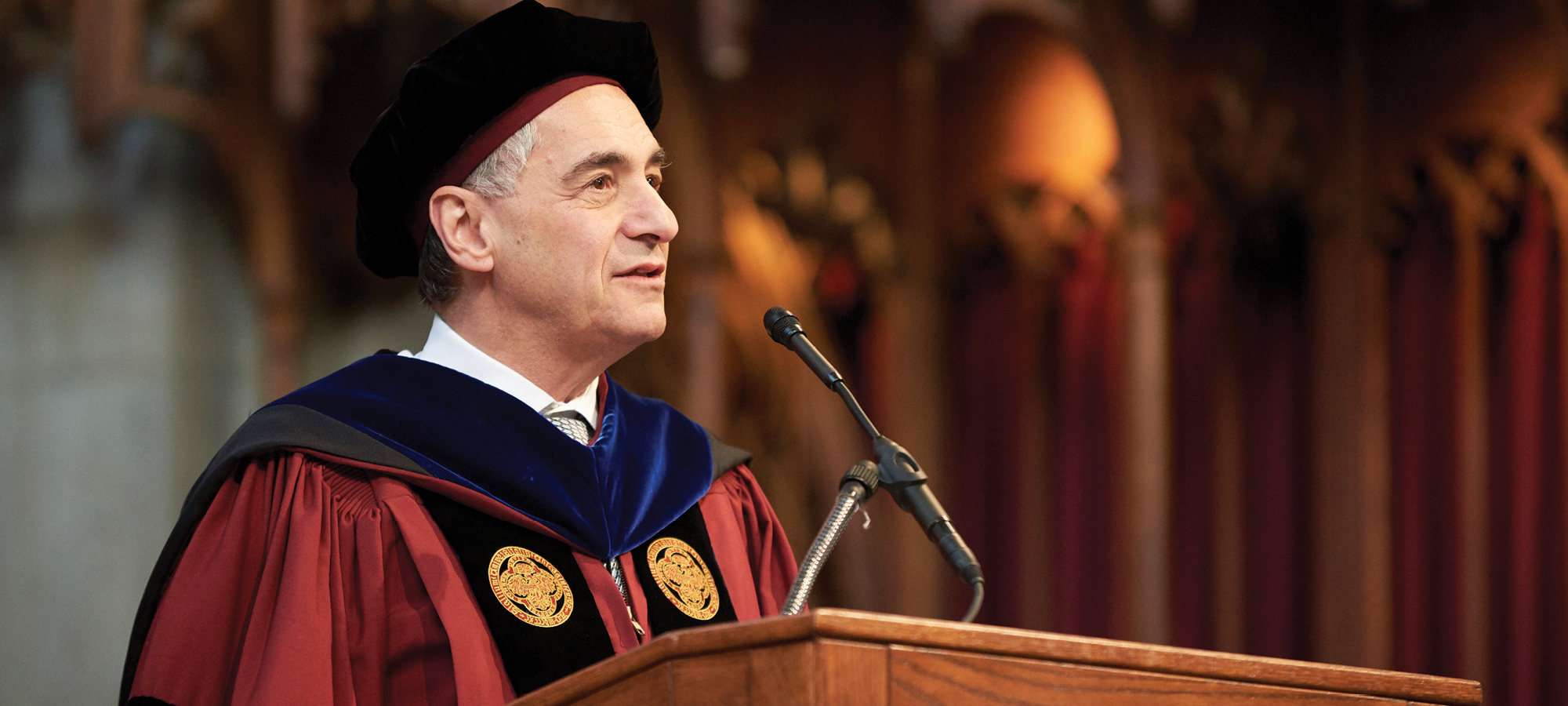
President Robert J. Zimmer, who took office in 2006, will become University chancellor in 2021. (Photography by Joel Wintermantle)
President Robert J. Zimmer will take a new leadership role after this academic year.
President Robert J. Zimmer will transition into a new role as chancellor of the University of Chicago in June 2021, the Board of Trustees announced in August.
While he agreed in 2017 to serve as president through at least 2022, Zimmer shared his intentions to accelerate his planned transition from the role of president at an August 12 Board of Trustees meeting. Zimmer had surgery in May to remove a malignant brain tumor and has since returned to work and is responding well to treatment.
In an email to the University community, chair of the Board of Trustees Joseph Neubauer, MBA’65, praised Zimmer’s work as president and expressed the board’s gratitude for his contributions. “During his presidency,” Neubauer wrote, “the University has enhanced its eminence among the top-ranked research universities in the United States and the world and has strengthened its position as a preferred destination for many of the world’s leading scholars and students. The University has made substantial investments to fulfill the programmatic ambitions of the faculty, support the exceptional scholarship and education for which the University of Chicago is known, build partnerships with our surrounding neighborhoods, and increase its financial support for students.”
Recognizing his profound impact on the University since he took office, the board asked Zimmer to assume the new role of chancellor, in which he will focus on high-level strategic initiatives, advancement of enduring University values, sustenance of key relationships, high-level fundraising, and working with the new president in these areas.
“The past 14 years as president of the University have been deeply rewarding for me,” Zimmer wrote in an August 13 message to the University community. “On one hand, this was due to the opportunity for enhancing the work of the University and our faculty, students, and staff, reaffirming our enduring values and consequent approach to research, education, and impact, and building new partnerships including our global efforts and a deeper engagement with the communities of the South Side of Chicago. On the other hand, the rewarding nature of the work I have been engaged in over these years is also due to the personal relationships that have developed with the many individuals with whom I have worked closely over that time.”
Zimmer became the 13th president of the University of Chicago on July 1, 2006, after serving most recently as provost of Brown University. His appointment as president was a return to UChicago, where Zimmer had been a faculty member and administrator for more than two decades, serving as chair of the Department of Mathematics, deputy provost, and vice president for research and for Argonne National Laboratory. He joined the University in 1977 as a Dickson Instructor in the Department of Mathematics.
In his email, Neubauer noted Zimmer’s devotion to the University of Chicago’s core principles, “with a particular focus on rigorous scholarly inquiry, academic freedom and free expression, as well as diversity and inclusion.” Zimmer, he wrote, “has reinforced the institution’s distinct culture and heritage, while helping the University evolve appropriately to the unique challenges of our time.”
In September Neubauer announced the launch of the search process for the 14th president of the University. The Trustee Search Committee, made up of 12 trustees plus President Zimmer in an ex officio capacity, and the 10-member Faculty Advisory Committee will work together closely to identify the next president. A new president, Neubauer noted, is elected by affirmative vote of a majority of the members of the Board of Trustees.
The committee is soliciting nominations from faculty, students, staff, alumni, and other friends of the University. It welcomes readers’ ideas regarding the credentials, experience, qualities, and values the committees should consider for the University of Chicago’s next president at presidential_search@uchicago.edu.
Measures of eminence: The University of Chicago during the presidency of Robert J. Zimmer
- Dramatically greater financial aid for undergraduate students through the Odyssey Scholarship Program and other initiatives.
- Greatly increased support for graduate and professional students.
- A nearly 300 percent increase in applications to the College since 2005, with admission yield rates of 80 percent.
- Growth of 24 percent in nonclinical tenured and tenure-track faculty, driven in part by new or expanded activities in molecular engineering, quantum information and technology, computer and data science, policy leadership, and neurobiology.
- Establishment of the University’s first engineering program, now known as the Pritzker School of Molecular Engineering.
- Establishment of institutes and centers within and across the disciplines.
- Investments in the arts, including the opening of the Logan Center for the Arts and the establishment of the Gray Center for Arts and Inquiry, the Green Line Performing Arts Center, and the Arts Block on East Garfield Boulevard.
- New or strengthened partnerships with the City of Chicago and local organizations, including through the opening of a level 1 adult trauma center at UChicago Medicine; the integration of the Urban Education Institute and the UChicago Charter School into the School of Social Service Administration; the collaboration between UChicago Urban Labs, nonprofit groups, and government agencies to develop policies aimed at improving the quality of urban life; and more.
- A broadened global engagement strategy drawing more international students with increased financial support, expanding student study abroad, and leading to the opening of the Center in Beijing, Center in Delhi, and the Francis and Rose Yuen Campus in Hong Kong, and plans for expansion of the Center in Paris.
- Unprecedented levels of philanthropic engagement, including the success of the University of Chicago Campaign: Inquiry and Impact, which concluded at the end of 2019 having raised $5.43 billion.
